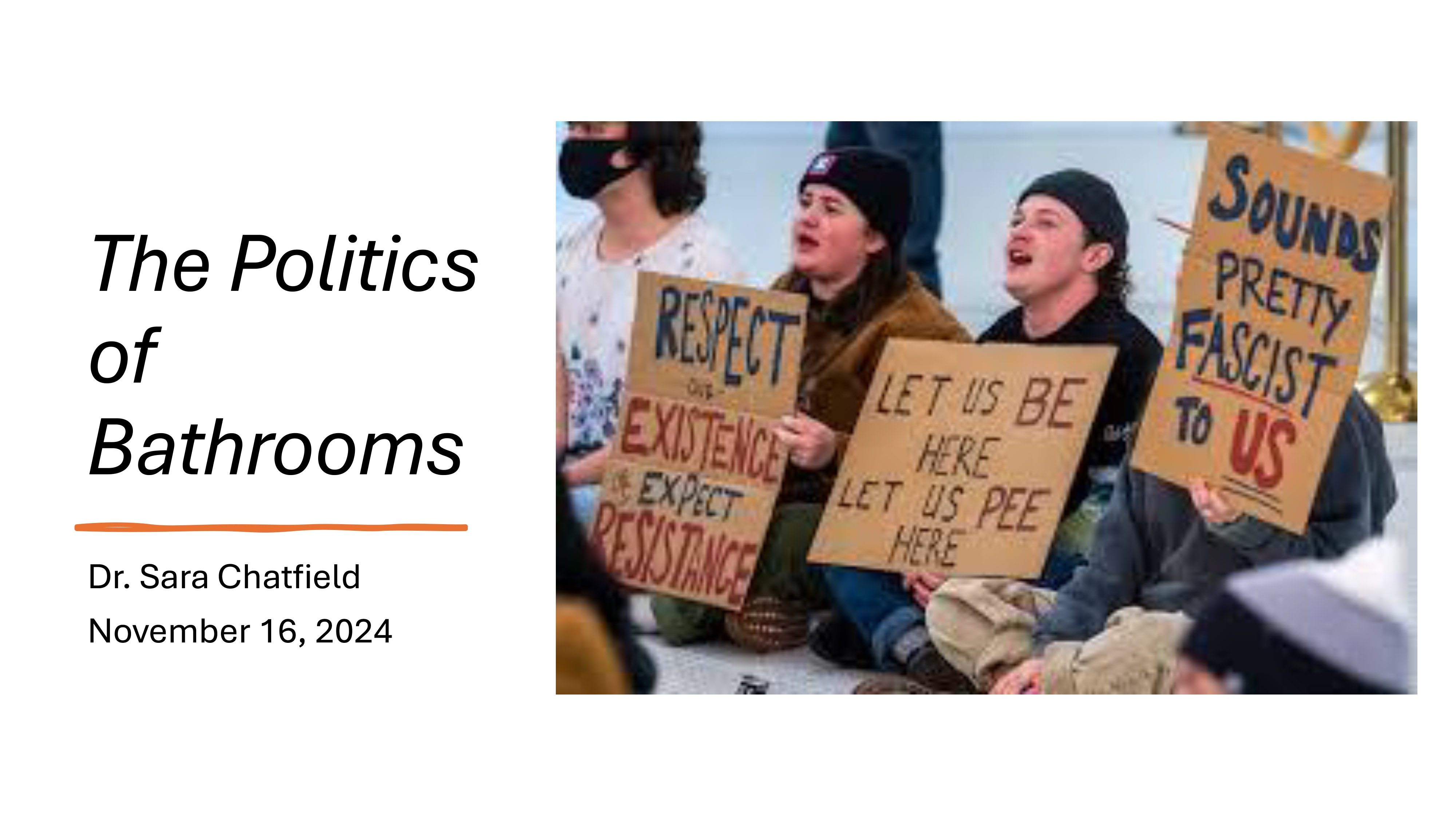The Politics of Bathrooms with Dr. Sara Chatfield
Marianne North November 20, 2024
We had a very successful meeting in November with almost 50 people in attendance from Seattle and Sno-King Branches as well as many other locations including Hawaii. We heard from our latest college scholarship recipients learning about them and their goals.
The main program was fascinating. It was eye-opening to listen to Professor Sara Chatfield of the University of Denver speak on the Politics of Bathrooms. She began by asking us:
What if you know you can’t find a safe, accessible bathroom? What are your options?
- Stay at home
- Try to avoid eating and, especially, drinking
- Experience physical impacts like dehydration, UTIs, etc.
- Resort to public urination/defecation which is Illegal in many cities. This can lead to sex offender registration in some places
- Or you can choose to go out “but only for a little while”

More pictures from her slide show at the end of the article
Dr. Chatfield then provided cases of a variety of people adversely affected by restrictions on access to bathrooms in public places. The mother of one young man, born with multiple disabilities, was restricted to where she could take him because no public bathrooms had diaper changing tables that would accommodate him. In a few places, the idea of family friendly bathrooms was implemented, with larger changing tables.
In another case, she told of an 10-year old boy who was arrested in a southern state for public urination because his mother could find no restroom nearby. The boy was jailed.
There was also a transgender student identifying as female who was denied access to the girl’s bathroom at school so she had to wait until she went home to go to the bathroom.
Dr. Chatfield summarized the history of public and workplace restrooms, with regard to race and gender and the role women’s groups played in improving access. For example, the Women’s Christian Temperance Union (WCTU) raised awareness of the lack of public facilities in the late 1800s. Often, the only restrooms available were in bars and you had to buy a beer to use them, so men were drinking and women couldn’t use them. The WCTU worked to get truly “public” restrooms. Bathrooms for women have evolved. For quite a time, women’s restrooms were pay toilets while men’s were free. Even today, lines at women’s bathrooms are usually much longer that at men’s bathrooms.
One of the slides Dr. Chatfield presented summarized the impacts of bathrooms on our public life. Bathrooms through the Lens of Social Citizenship:
- Social citizenship is more than formal/legal citizenship
- Social citizenship = full access to society’s opportunities, to dignity and inclusion
- Bathroom access impacts social citizenship because without access to a safe, accessible bathroom, you can’t go out in public (or to a job, or school, etc.) for longer than you can “hold it”
- [Access to bathrooms has] Biological and symbolic components
- Bathroom access policies vary from state to state and city to city
Two states, California and Massachusetts, have laws requiring equal access in schools and all public spaces, but there is a patchwork of laws across the nation. In Blue states such as Washington there is more recognition through legislation of these issues in providing an essential public resource and also making it safe for all. An organization called STALL is working on revising building codes so it is easier to build multi-gender bathrooms.
Access to menstrual supplies also has been an issue, and laws have been passed in different states to require public schools and/or state-run female prisons to provide supples to females. Washington requires its schools to have free supplies but not its women’s prison.
Efforts are being made to provide equal access to women in nontraditional workplaces, such as for women truck drivers and electricians. Washington State recently passed legislation helping women construction workers. Still there is more work to be done in providing sufficient restrooms for women, LGBTQ and the disabled. In Amsterdam, the Netherlands, recently, women protested over the lack of public facilities for women.
Dr. Chatfield outlined gender-inclusive bathroom policies as having:
- Gender inclusive signage on single-stall bathrooms
- Anti-discrimination laws (or regulatory guidance) that explicitly reference bathroom access for trans and gender non-conforming people
- Building codes that allow for multi-stall all-gender bathrooms
Dr. Chatfield will soon have her second book published, The Politics of Bathroom Access and Exclusion in the United States, available from Cambridge University Press. A free PDF copy of her book can be obtained by emailing her at .(JavaScript must be enabled to view this email address)
Click on any picture to see the slide show





